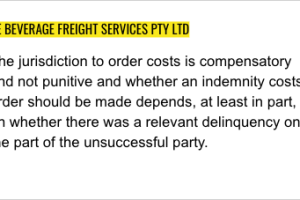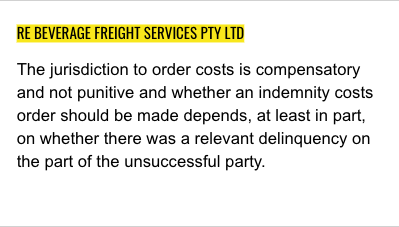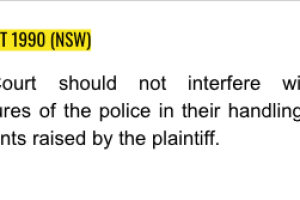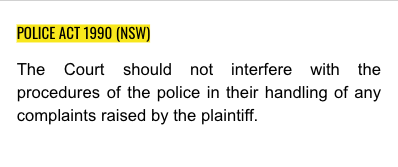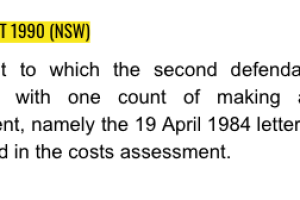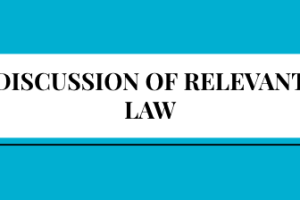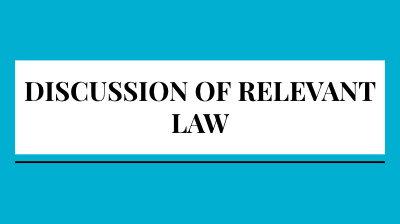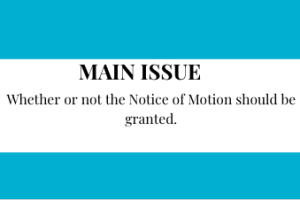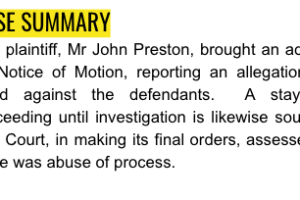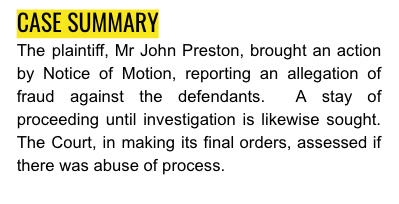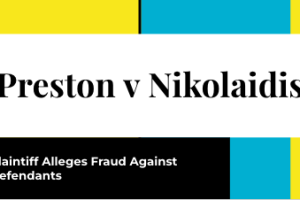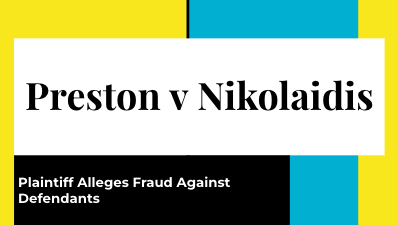Plaintiff Alleges Fraud Against Defendants

Preston v Nikolaidis [2022] NSWSC 813 (20 June 2022)

The plaintiff, Mr John Preston, brought an action by Notice of Motion, reporting an allegation of fraud against the defendants. A stay of proceeding until investigation is likewise sought. The Court, in making its final orders, assessed if there was abuse of process.

Facts:
Between about 1984 and 1992, M D Nikolaidis & Co (MDN) acted as solicitors for the plaintiff and various companies controlled by the plaintiff (Preston entities) in a number of matters. The first defendant, who was a partner of MDN, acted as the principal point of contact between MDN and the Preston entities.
The Preston entities terminated MDN’s retainer in early October 1992 and the plaintiff requested the return of all of MDN’s files relating to the Preston entities. After termination of the retainer, MDN sent the plaintiff a summary of accounts stating that the sum of $95,749.40 was owing for legal services provided by MDN.
Subsequent correspondence between MDN and the plaintiff did not result in payment of the fees claimed by MDN or delivery by MDN to the plaintiff of itemised bills or the legal files for work undertaken for the Preston entities. The plaintiff and Preston entities commenced proceedings in 1993 (file number 1993/23395) (1993 proceedings) in respect of 16 bills of costs that MDN had issued to the plaintiff and/or Preston entities for legal work the firm had done.
RS Hulme J referred the matters for taxation pursuant to ss 199 and 200 of the Legal Profession Act 1987 (NSW). The assessment of the bills of costs the subject of the proceedings was to be determined by a taxing officer of the Supreme Court.
The bills of costs were never paid, and no steps were taken to recover unpaid fees. Since 1993, the defendants have relied upon their lien over the plaintiff’s files as security for the payment of such an amount that might be assessed as owing under the costs assessments.
The judgment of Williams J disposed of a recent application by the plaintiff. Her Honour ordered that the plaintiff pay the costs on an indemnity basis. Her Honour concluded that leave to file the verified pleading should be refused on the ground that it is an abuse of process.
On 28 September 2016, costs assessor Michael W Robinson issued a Certificate of Determination of Costs pursuant to ss 375 and 378 of the Legal Profession Act 2004 (NSW) (“the 2004 Act”). The plaintiff lodged a review application with the Manager Costs Assessment in respect of those certificates. On 13 February 2017, the Costs Review Panel made its determination and issued Certificates of Determination with respect to the review. To obtain the Certificates, the plaintiff was required to pay the costs of the Costs Review Panel.
On 22 February 2018, the defendants paid the costs of the Costs Review Panel, which the plaintiff had declined to pay and on 17 February 2018 the Costs Review Panel issued the certificates, their determinations and their reasons. On 27 March 2018, the plaintiff commenced these proceedings, being the summons seeking leave to appeal from the determination of the Costs Review Panel. The plaintiff brought an action by Notice of Motion filed 10 May 2021 seeking to report the allegations of fraud, corruption and criminal acts by the defendants in this proceeding to NSW Police and the Attorney General as well as a stay of proceeding until the investigation of NSW Police and the Attorney General to make a finding on the fraud, corruption and criminal acts by the defendants.

Issue:
Whether or not the Notice of Motion should be granted.

Applicable law:
Crimes Act 1900 (NSW) - pursuant to which the second defendant was charged with one count of making a false instrument, namely the 19 April 1984 letter that he had used in the costs assessment.

Legal Profession Reform Act 1993 (NSW) - introduced the system of costs assessment to replace taxation of bills of costs by an officer of the Court.
Police Act 1990 (NSW) - provides that the Court should not interfere with the procedures of the police in their handling of any complaints raised by the plaintiff.

Supreme Court Act 1970 (NSW) - where a Judge may refer matters to the Attorney General.
Supreme Court Rules 1970 (NSW) - provides that where there is contempt of the Court, the Registrar may be directed to commence proceedings.
Uniform Civil Procedure Rules 2005 (NSW) - relied upon in seeking that the affidavits are to be placed in a sealed envelope on the Court file and that envelope may not be opened except by order of this Court.
Nikolaidis v The Queen [2008] NSWCCA 323 - where an appeal against both conviction and sentence was dismissed in December 2008.
Pethers v Minister for Agriculture [2010] NSWSC 805 - relied upon in holding that even if one were to understand that phrase with reference to the materials in the affidavits, notwithstanding their admissibility is highly doubtful, it remains unclear precisely the conduct that amounts to fraud, corruption or criminal acts. This consideration is, in and of itself, a proper basis to refuse the first prayer for relief.
Preston v Nikolaidis [2021] NSWSC 36 - where the plaintiff and Preston entities commenced proceedings in 1993 (file number 1993/23395) (1993 proceedings) in respect of 16 bills of costs that MDN had issued to the plaintiff and/or Preston entities for legal work the firm had done.
Preston v Nikolaidis [2022] NSWSC 549 - held that dismissal of the plaintiff’s motion as an abuse of the processes of the Court warrants an order that the costs of the defendants payable by him be assessed on the indemnity basis.
Re Beverage Freight Services Pty Ltd [2020] NSWSC 509 - provides that the jurisdiction to order costs is compensatory and not punitive and whether an indemnity costs order should be made depends, at least in part, on whether there was a relevant delinquency on the part of the unsuccessful party.

Wang v Cai (No 2) [2021] NSWSC 1268 - summarises the principles for when a court might depart from the usual position and make an order for costs, namely that: the subject matter of the interlocutory application is discrete and self-contained making it a suitable vehicle for a separate order for costs; whether some of the conduct of the unsuccessful party to the motion may be seen as being unreasonable; and that there is still some considerable distance to go in the litigation so that it may be appropriate that the successful party obtain the fruits of its costs order now.
Analysis:
The first order sought by the plaintiff is too vague and uncertain. The proposed order does not specify what “fraud, corruption and criminal acts by the defendants” is alleged. Although there are statutory provisions where a Judge may refer matters to the Attorney General (see, eg, s 131(7) of the Supreme Court Act 1970 (NSW) with respect to the statutory offence of disrespectful behaviour in Court), the plaintiff was not invoking any such statutory basis for the order that he sought.
Even if one assumes that the contents of the plaintiff's affidavits are admissible, it is clear that the motion and the plaintiff’s assertions of fraud and criminal acts are to reagitate matters that have been dealt with in previous proceedings. The plaintiff also raised issues concerning fraud on the part of the second defendant that have already been dealt with in the criminal justice system.
There is a wide discretion conferred by the Police Act 1990 (NSW) for the NSW Police Force to decide how they would discharge their functions. This Court should not interfere with the procedures of the police in their handling of any complaints raised by the plaintiff. The affidavits and the motion in substance constitute the plaintiff making indiscriminate allegations of wrongdoing with respect to persons or matters that have already been heard and decided, or are pending disposition, in this Court and other courts and tribunals.
Conclusion:
The Notice of Motion filed by the plaintiff on 3 May 2021 is dismissed. Subject to further order, no person, other than a party to these proceedings (or a lawyer retained by a party to these proceedings), be granted access to the Court’s file without the leave of a Judge. The plaintiff is to pay the defendants’ cost on an indemnity basis.

